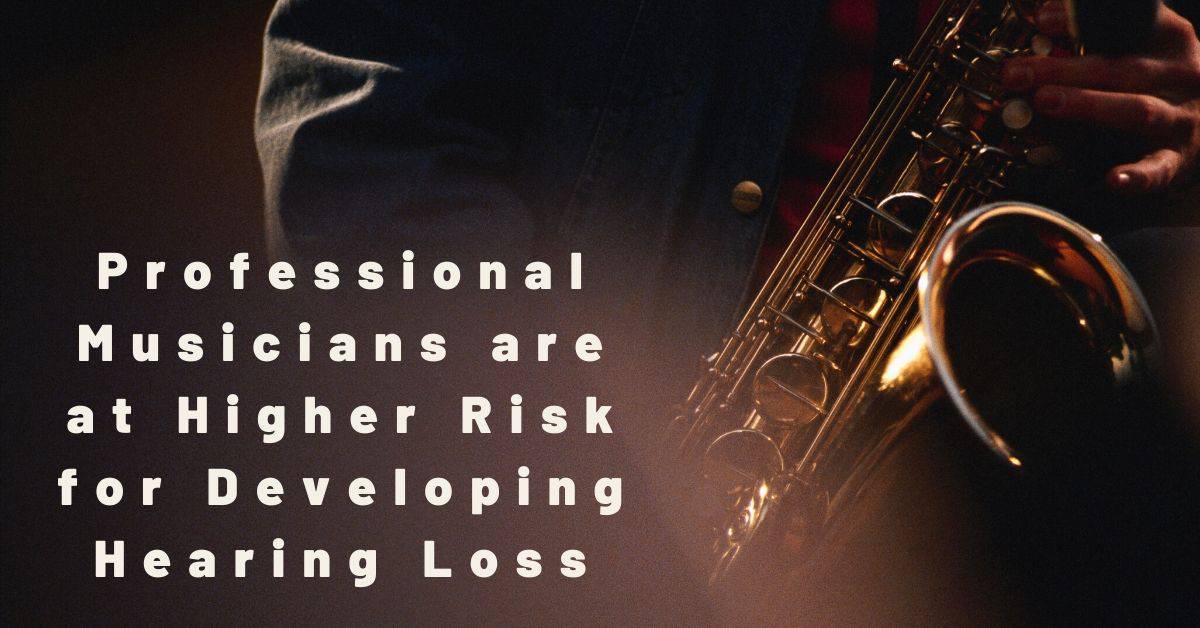You may not think that professional musicians have a dangerous job, but musicians are nearly 4 times as likely to develop a hearing loss than non-musicians! Hearing loss can have a major impact on musicians’ careers and quality of life, and struggling to hear affects social, emotional and even physical health. As anyone with hearing loss or tinnitus knows, living with damaged hearing makes it hard to follow conversations, connect with family and friends, and avoid feelings of loneliness and isolation.
Why Do Musicians Have a Higher Risk of Hearing Loss?
Profession musicians have a much higher risk of hearing loss than the general public because they’re constantly exposed to very loud sounds. During daily practices, rehearsals, and performances, sound levels often reach extremely high volumes, and musicians spend several hours per day in dangerously loud environments. When they practice and perform without hearing protection, these loud sounds can damage the cells of the inner ear, leading to a permanent hearing loss. Over time, hearing loss will worsen, and it will become harder for professional musicians to do their jobs.
Noise Induced Hearing Loss is Preventable
Unlike age related hearing loss that can be a natural part of aging, or conductive hearing loss that’s caused by illness, injury, or infection, noise induced hearing loss is preventable! Because it’s caused by noise, you can take steps to protect your ears from this noise, and safeguard your hearing health. Musicians should take extra precautions to protect their hearing, learn more about noise induced hearing loss, and carefully monitor their hearing health.
Get a Baseline Hearing Test
Musicians should schedule regular hearing tests to monitor their hearing health, and be alert to any changes in their hearing. Even if you don’t think you have a hearing loss, getting a baseline hearing test will give you a clear picture of your normal hearing range, and you’ll be able to notice the moment this range changes. Musicians often face high frequency hearing loss, and the first sounds to be affected will be higher pitched sounds.
Invest in Musician’s Earplugs
Along with regular hearing tests and baseline testing, wearing musician’s earplugs will protect your hearing on and off stage. Professional musicians often don’t wear hearing protection because it can muffle sounds, or distort the sound of their own voice or instrument. Musicians earplugs are digital earplugs designed to tackle this problem. Rather than reducing all the sounds in the environment, musician’s earplugs will analyze the sound around you, and leave safe sounds unchanged. This usually includes the sound of your own voice or instrument. The ear plugs will reduce the volume of dangerously loud sounds, and you’ll hear the music clearly without risking your hearing health. Musicians earplugs will also reduce sounds more evenly across all frequencies, so high- and low-pitched sounds will remain balanced and clear, and sounds will sound natural.
Both musicians and fans need to take steps to protect their hearing, and if you’re attending a concert with friends, protect your hearing health with earplugs. Music fans can also benefit from musician’s earplugs, and you’ll enjoy all the rich sounds of music without muffling or distorting sounds. You won’t strain to hear soft sounds, or be tempted to take out your hearing protection during quieter songs.
Hearing Aids for Music Lovers
Hearing loss often affects high-frequency sounds, and many instruments, as well as the normal singing range, often fall into the pitches where you have hearing loss. Those with hearing loss complain that they can’t enjoy music, and it often sounds muffled or thin. Without all the textures that give music it’s full sound, both musicians and music lovers often stop listening to music altogether.
Modern hearing aids have advanced music listening programs that help you hear specific instruments, distinguish between instruments and singers, and hear the exact pitches without any distortion. Hearing technology can’t restore your hearing, but it can help you enjoy music again by using Bluetooth technology to stream music right to your ears and increase your ability to hear all the layers in the music. Music programs will amplify lower frequencies as well as high frequencies to help you hear all the music clearly, and maintain a natural, rich sound.


